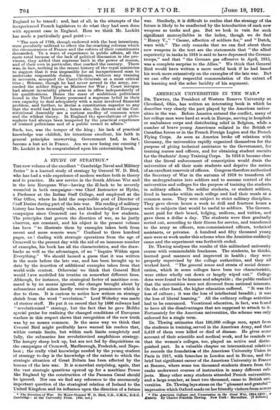ENGLAND AND THE FRENCH REVOLUTION.*
Amarinakti examples have made the reviewer look with a good deal of suspicion at works composed with the object of gaining some academic honour, but nobody need be afraid of Mr. Lockitt's thesis for the degree of M.A. on The Relations of French and English Society during the first three years of the revolu- tion and the time which immediately preceded it.
Mr. Lockitt discusses the causes which led up to the revolu- tion, and considers that we may find another cause which assisted the writings of the philosophers and encyclopaedists or, as Mrs. Webster would say, the machinations of the Orlcanists. The French Revolution was, he points out, not a mere shuffle of Constitutional cards, but rather was a new way of understanding life. Now, precept is seldom enough to move men deeply.
They must have example.
" The exact influence of the philosophers in preparing the Revolution is a question which has been much discussed ; the remorse of Raynal and Morellet shows that they, at any rate, believed themselves to be in part responsible ; Robespierre and his followers openly put into practice their reading of Rousseau's doctrines. But Man is, after all, a conservative animal ; and for the accepted routine of generations to be thus uprooted and torn away from the minds of the generality of mankind, it needs more than philosophical arguments, more than halcyon pictures of unknown lands, however eminent the author. Granted that Voltaire, Montesquieu and Rousseau came at the psychological moment when, in the restless growth of knowledge, men's reason rebelled against the unreasonableness of the social structure, yet one cannot help feeling that the words of the destroyers would have fallen on deaf ears if the constant visiting of England, and America's successful resistance to oppression, had not disclosed to French Society the practical application of their theories."
To the readers of La Ncuvelle Hiloise, a work itself so greatly influenced by Clarissa Marlowe, English society seemed, to a great extent, a working model• of all the new attractive doctrines of the return to Nature and of sensibility. Here was a country where it was not unknown for mothers of the highest rank to suckle their babies ; where gentlemen lived on their own estates and promoted agriculture ; where ladies with their own hands dispensed soup and sympathy to the " labouring poor " ; where only a nobleman's eldest son was titled, and where, therefore,
you might find the strange anomaly of a Great Lord with a brother in trade or working as a lawyer. , To the more frivolous, the attraction to England was primarily the rumour of routs, masquerades, horse races and a disregard of fine manners, fine dress, and etiquette. When French travellers arrived in England they found a society less elegant, less polished, it is true, than their own, but one occupied with large concerns, great affairs, real questions : all this lent it dignity. When they returned to Paris their own life seemed small and petty, consisting as it did only of the hourly battle against ennui. Without a change in the Constitution, how could Frenchmen approach to English ideals ? Well, at least, they could form clubs like the English, and so was founded that which developed terribly into the clubs of the Jacobins and the Cordeliers.
In every detail of French life Mr. Lockitt traces this communi- cation with England and its influence. Trade, gambling, duelling, the drama, political _ideas, religion, sentimentalism in all its branches, as the return to Nature, the English garden and the philanthropic movement—in all this was the influence of
• The Relations of French and Emits* Society (1768-1798). By O. H. Lodat. London : Longinus. tee. 6d. net.] England to be traced ; and, last of all, in the attempts of the inexperienced French legislators to do what they had seen done with apparent ease in England. Here we think Mr. Lockitt has made a particularly good point :— " The men of 1789, though endowed with the best intentions, were poculiarly unfitted to effect the far-reaching reforms which the circumstances of France and the eahiera of their constituents demanded. To a want of experience in public affairs, all the more total because of the lack of political discussion in the pro- vinces, they added that supremo faith in the power of reason, and of their own in particular, that marked the century. There was, in fact, nothing in the recent history of the royal ministries to suggest that it was impossible for ad inexperienced man to undertake responsible duties. Calonne, without any training in accounts, accepted the Contrale-Generale at a most critical time ; Brienne, though he had never served in the army, suc- ceeded the soldier S6gur as Minister for War ; Court intrigue had almost invariably placed a man in office independently of his qualifications. Hence the mass of ambitious politicians found in the Third Estate possessed a supreme belief in their own capacity to deal adequately with a most involved financial problem; and further, to devise a constitution superior to any that the world had known ; hence also, the decrees of the Con- stitutional Assembly are a curious medley of common sense and the wildest theory. In England the speculations of philo- sophers had always been tempered by the practical experience of trained politicians and of a public versed in affairs.'
Such, too, was the temper of the king ; his lack of practical knowledge was childish, his intentions excellent, his faith in general principles unswerving. Government had, in fact, become a lost art in France. Are we now losing our cunning ? Mr. Lockitt is to be congratulated upon his entertaining book.



































 Previous page
Previous page